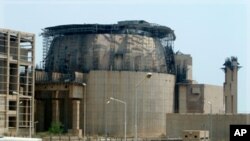Senior Obama administration officials said Tuesday that the International Atomic Energy Agency report on Iran underscores Tehran's failure to abide by its international obligations and prove the peaceful nature of its nuclear program.
Officials briefed reporters after the Vienna-based agency released its report, saying there is "credible" information that Iran engaged in activities aimed at developing nuclear weapons.
The International Atomic Energy Agency, or IAEA, says the information indicates that Iran worked on the design of an atomic weapon, and tested the components of such a weapon as part of what the agency calls a "structured" program before 2003. Iran, the report says, might still be engaged in related research.
Iran says its nuclear program is for peaceful civilian energy and medical purposes. Before the IAEA report was released, Iranian President Mahmoud Ahmadinejad dismissed it, saying the agency is being used by the United States and Iranian officials have warned Israel and the United States against taking military action against Iran.
Senior Obama administration officials say that although the report does not conclude that Iran has restarted the same kind of program it had in place before 2003, it raises concerns about possible ongoing research related to nuclear weapons development.
The officials say the report "further undermines" the credibility of Iranian government statements challenging international pressure over its nuclear program. Iran, the officials say, needs to respond by answering the questions raised by the IAEA.
Senior administration officials say the report does not make any judgment as to how advanced an Iranian effort might be to develop a nuclear device that could be placed on a missile, saying that they could not discuss intelligence assessments.
But they say Iran's government needs to respond to the report. The officials say the United States will consult with its allies and partners about future steps, looking at ways to put more pressure on the Iranian government - including additional sanctions - if it does not answer questions raised in the report.
The officials were asked about the difficulty of building support in the U.N. Security Council, specifically from Russia and China, for new sanctions, given the report's finding that some of Iran's nuclear activities might have been for peaceful purposes.
The officials pointed to IAEA findings on Iranian work on fast and multipoint detonators as what they called "a very telltale sign" of nuclear weapons development.
The IAEA report is being examined closely in the U.S. Congress, where lawmakers say it provides more momentum for legislation moving through the House of Representatives and U.S. Senate to tighten existing U.S. sanctions on Iran.
House Committee on Foreign Affairs chairwoman, Republican Ileana Ros-Lehtinen, says the IAEA report demonstrates the need for the United States and other nations to take "decisive action" to stop Iran from acquiring nuclear weapons.
Democrat John Kerry heads the Senate Foreign Relations Committee.
"A lot of conversations are taking place right now to figure out what the best responses are going to be. But it clearly means we have to ratchet up on Iran - probably tougher sanctions, among other things," Kerry said.
Republican Senator Mark Kirk is co-sponsoring legislation with New York Democrat Charles Schumer aimed at Iran's central bank. Kirk says stronger sanctions on Iran might be needed.
"In the end, we may also have to think about an oil quarantine on Iran, so that Iran cannot sell oil. That would quickly collapse the economy. If you don't do that, then you basically push especially Israel into considering a military option. And the reason why is Iran has transferred all of its advanced weapons that it currently holds to Hezbollah, including cruise missiles. I think there is a near-100 percent chance that, once [Iranian President Mahmoud ] Ahmadinejad develops nuclear weapons, he will give them to Hezbollah. And I don't think the world can put up with that," Kirk said.
The IAEA board is to decide whether to report Iran to the U.N. Security Council.
U.S. officials have not commented on extensive media reports, including in Israel, speculating about potential military action against Iran. President Barack Obama has said no option has been ruled out regarding Iran.
Senior Obama administration officials repeated that on Tuesday, saying that the United States is committed to "doing what we can" to prevent Iran from obtaining a nuclear weapon. But they said there is "additional space" to continue increasing the costs for Iran for its behavior.
US: Iran Must Answer Questions Raised by UN Nuclear Report




